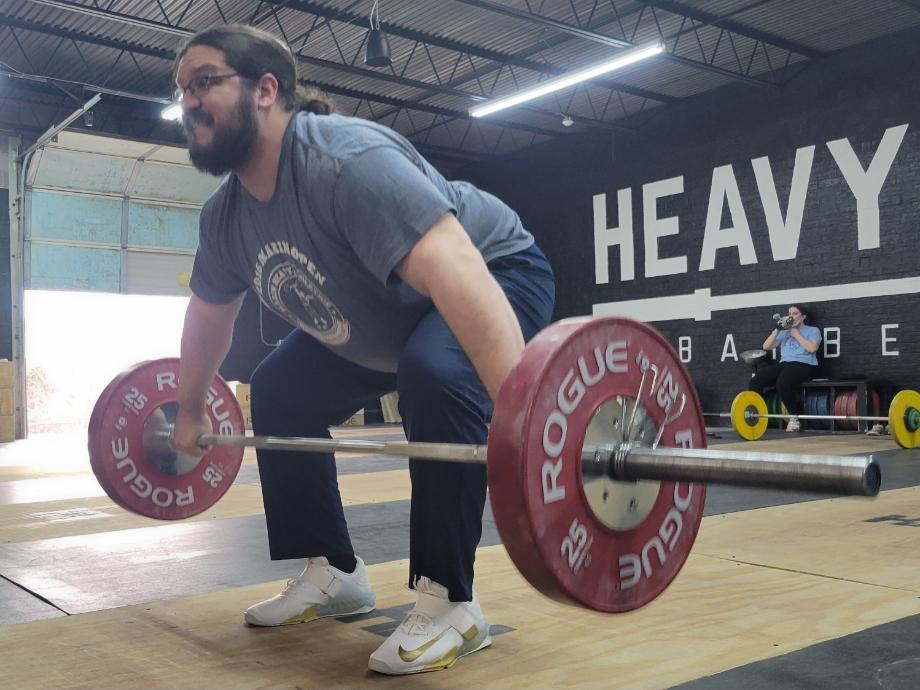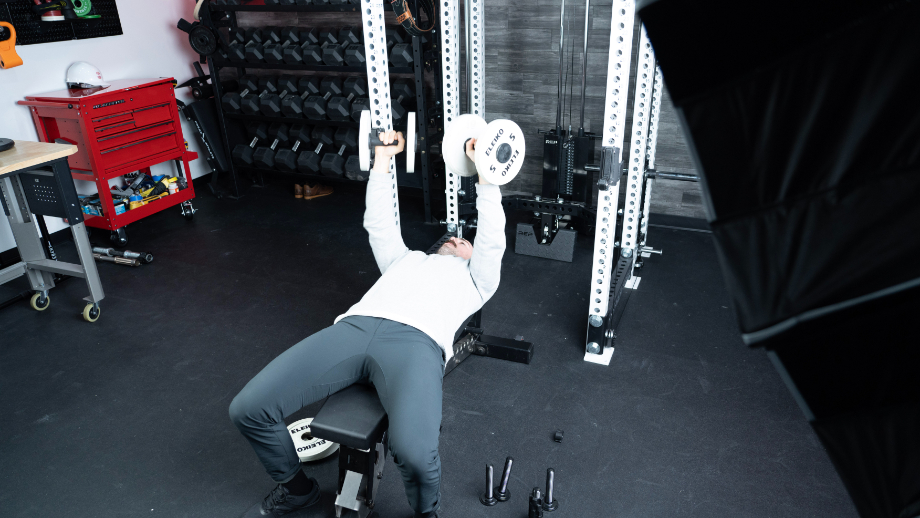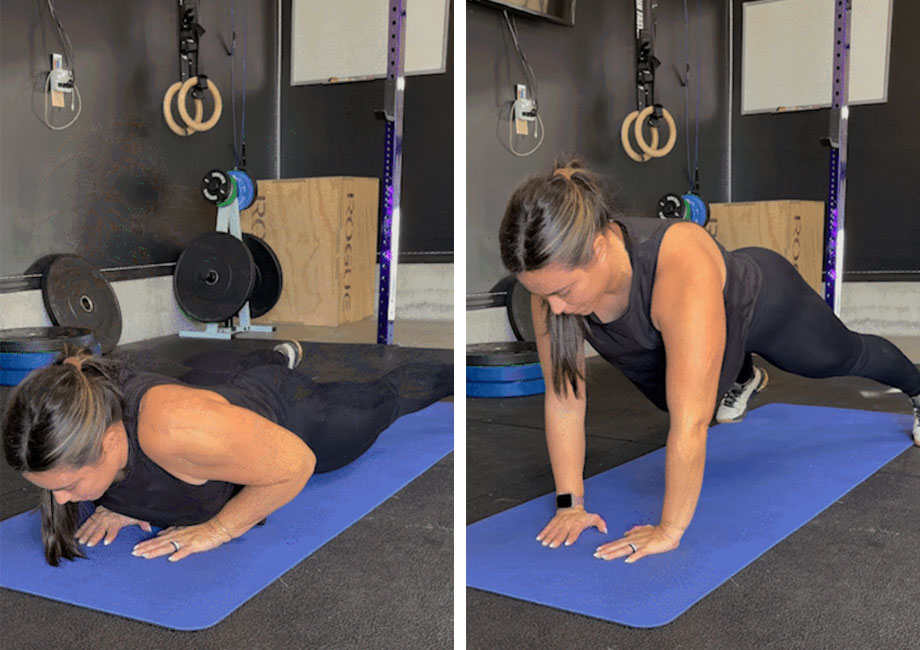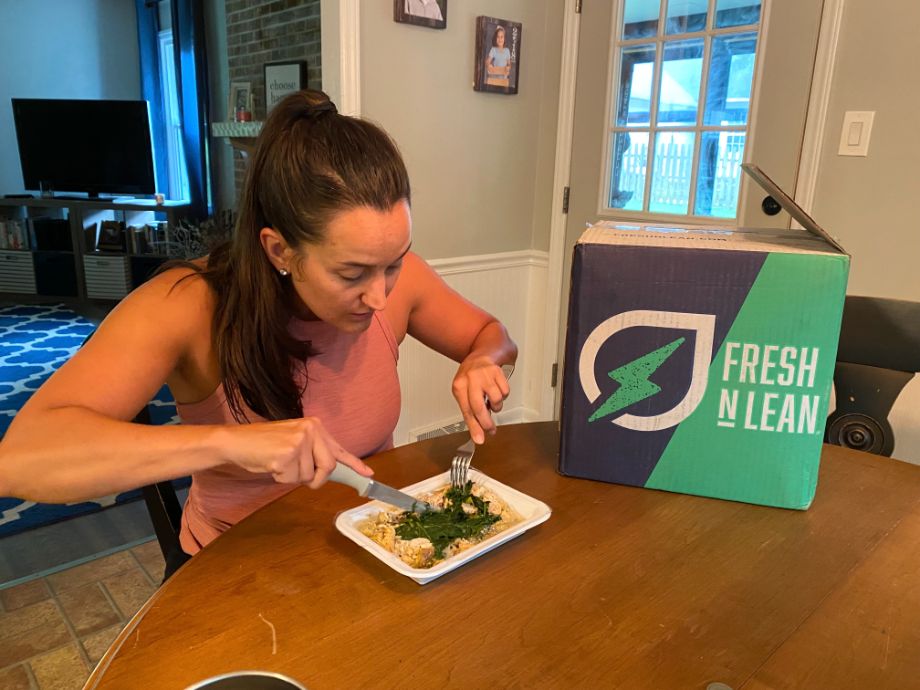Maybe it’s because I’ve been competing in Olympic weightlifting for 25 years now, but regardless, I love weightlifting shoes. The best weightlifting shoes have a sturdy, stable base to stay grounded during heavy lifts, as well as a raised heel to help lifters achieve a better position during squats, cleans, and snatches.
RELATED: Proper Squat Form
One thing I’m not a fan of is the price. I’ve used lifters from top brands like Reebok, Adidas, Nike, and more, and lifting shoes can cost $200 or more easily. To make lifting shoes more affordable to everyday gym-goers, Nike produced their budget lifter, the Savaleos. At $125, these shoes are much less expensive than the wildly popular Nike Romaleos or Adidas Adipowers.
Still, it leaves you wondering how these weightlifting shoes compare to other popular brands and shoes. I was able to try out the Savaleos for several weightlifting workouts, and in this Nike Savaleos weightlifting shoes review, I’ll use my experience as an Olympic weightlifter to give you the ins and outs of this lifting shoe: how it holds up, who it’s best for, and if it’s worth its price.
Dozens of Gym Shoes Tested by Experts
We’ve tested over 70 gym shoes with more on the way, from cross-training shoes to running shoes and everything in between. Our team of experts consists of certified personal trainers, CrossFit Level 1 trainers, lifting coaches, and competitive athletes, so we also come with expertise on different gym shoes and fitness apparel for any type of training.
I personally tried out the Nike Savaleos for several workouts over a week of Olympic weightlifting training, the best test for trying out durable weightlifting shoes. I did powerlifting movements such as squats and deadlifts, as well as the explosive Olympic lifts: the snatch and clean and jerk. While using the shoes, I took note of the following aspects:
- Stability: How grounded do you feel during slow and dynamic movements?
- Durability and construction: Are these shoes built to last? Did you experience any significant wear while using the shoes?
- Appearance: While not mandatory, you want your shoes to look nice. Also, what colorways are available?
- Overall value: Shoes specializing in one discipline can be pricey, but you want to make sure that the price makes sense for what the shoe can offer in durability, stability, and versatility.
Nike Savaleos
Nike Savaleos Weightlifting Shoes
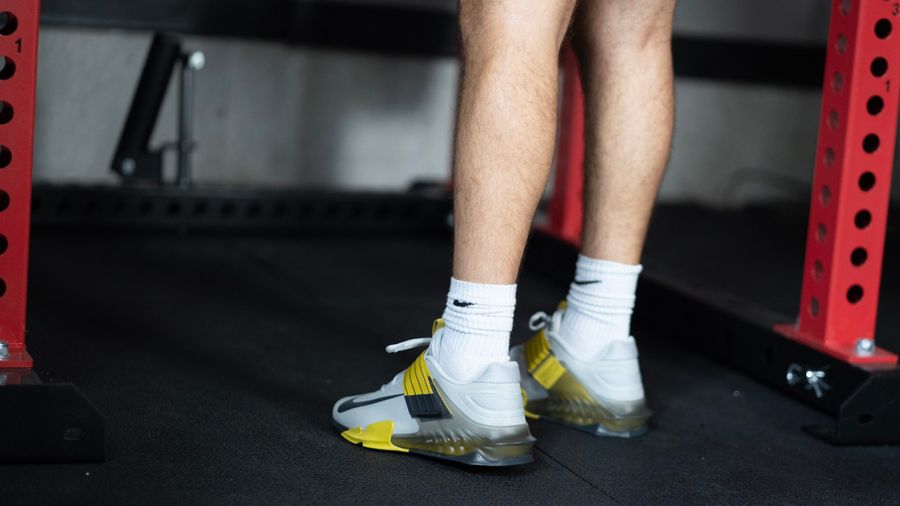
Product Highlights
- Weightlifting shoes
- 15 mm heel drop
- Wide toe box
- Hook and loop strap
Pros & Cons
Pros
- Great shoes at a great price point ($120)
- Wide toe box adds stability to lifts
- Good option for casual lifters and beginners
Cons
- Midsole might be too responsive for people who lift super heavy
- Moderate heel height (15 mm) doesn’t provide the best assistance for squatting
- Limited velcro surface area on straps
Bottom Line
If you’re looking for the best combination of function, style, and price, you can stop right here. The Nike Savaleos are by far the best weightlifting shoes for most people because of their value proposition.
A Quick Look at the Nike Savaleos
Nike needs no introduction when it comes to athletic apparel and shoes. The company has been involved in sportswear since its start in 1964. The company focuses on sports-specific clothing and footwear, although they’ve recently released Nike Strength equipment, too.
When it comes to weightlifting shoes, Nike has made arguably the most popular lifting shoe with the Nike Romaleos 4, although the second edition of those weightlifting shoes have a near-cult following because of their durability (I still use a pair myself). However, the Romaleos are a bit pricey, costing $200.

Nike’s response was a budget-friendly option: the Nike Savaleos. At $125, the Savaleos have a lower heel-to-toe drop of 15 millimeters, 5 millimeters lower than the Romaleos. Additionally, the Savaleos only have one velcro strap across the top of the shoe, unlike the Romaleos’ two straps.
Before You Buy
- The shoes come in black and white colorways on the Nike website; you can find some different colorways on other websites, however, such as Rogue Fitness.
- The lower heel-to-toe drop might not be ideal for all lifters, particularly those with ankle mobility issues. For less mobile people, a higher elevated heel is ideal.
- Nike warns that these shoes run small and to order a half-size up. I ordered my normal shoe size, and it was a bit narrow and required some breaking in.
Are the Nike Savaleos Worth It?
At this price point, the Nike Savaleos will make a lot of people happy. The Nike Romaleos are $200, while competitors like the Adidas Adipowers 3 and Reebok Legacy Lifter 3 are more. Meanwhile, the Savaleos are only $125, saving you nearly $100 off other top lifting shoes. Other weightlifting shoes are priced similarly, but these shoes are built solidly at their price.
It’s not made to be a lifting shoe for top-tier elite weightlifters, and that’s OK; most people aren’t looking to be competitive in weightlifting or powerlifting. The midsole is a bit more responsive than most weightlifting shoes, but it’ll be more than enough support and stability for most people and lifting routines. The lower heel may not be everyone’s cup of tea—me included—but the shoe is still great value, earning a 5 out of 5 for its overall value.
Great for:
- Beginning lifters
- Those needing a budget-friendly lifting shoe
- Gym-goers who can appreciate a shoe with a sleek design
Not recommended for:
- Elite weightlifters needing the most stability in their shoes
- People who struggle with ankle mobility
- Fitness lovers wanting a more versatile shoe or cross-trainer
Nike Savaleos Specs
| Price | $125 |
| Heel-to-toe drop | 15 mm |
| Size range | Men’s 5-18 (Women’s 6.5-19.5) |
| Colorways | Black/White/Gray Fog/Laser Orange, White/Black/Iron Gray, White/Metallic Gold/Wolf Gray/Photon Dust, Gray Fog/Clear Emerald/Total Orange |
| Features | Flat, wide base; hook-and-loop strap across midsole; mesh inset at the heel; padded tongue and collar |
Using the Nike Savaleos
When it comes to a great shoe, especially budget-priced ones, people want to know if it can handle some wear and tear. Thankfully, I got to try out these shoes and I was able to lift some heavy weights on them. I did a variety of lifts—squats, deadlifts, clean and jerks, and the snatch exercise—over the course of a week.
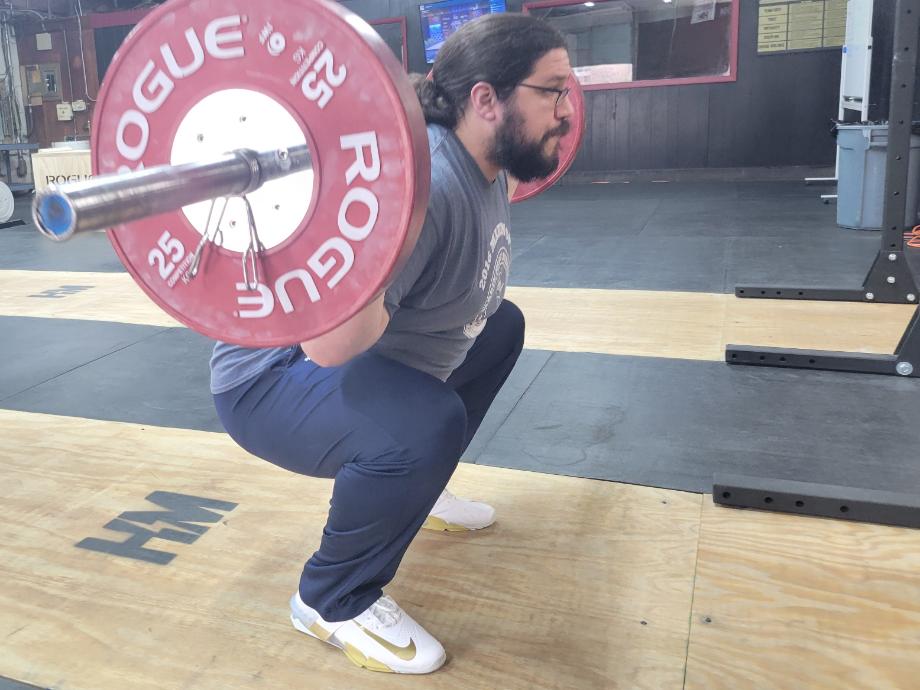
And I did some heavy lifts. The heaviest I squatted was about 600 pounds in these budget shoes, and I snatched 340 pounds and clean and jerked nearly 400 pounds, as well. Overall, these shoes held up well with the heavy weights, and I felt stable and steady in the shoes throughout all exercises. The midsole strap helped keep my foot secure as well, although maybe not as much as a dual-strap shoe.
The shoe has a heel height of 15 millimeters, which is lower than the lifters I currently use, the Romaleos 2. The lower heel height messed with my technique on the Olympic lifts, where I was beginning with my hips lower and squatting differently, too. Someone with better ankle mobility will be fine with these shoes, but if I were to switch to these shoes, it’d take some time to get comfortable with the slight technical changes I’d have to make.
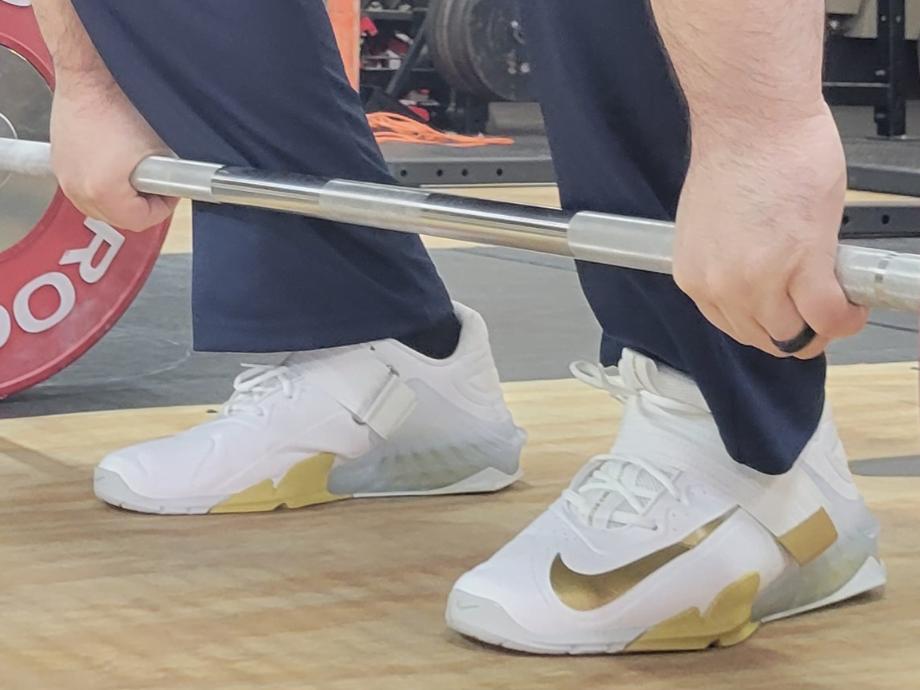
Another thing was the cushioning of the midsole. With it being a bit more responsive than other lifters I’ve used, I didn’t feel the stability and groundedness of other lifting shoes. Still, this comes from 25 years of weightlifting experience. Did the slight responsiveness throw me off? Not really, and I don’t expect it to mess with most people. This adds to their functionality, though, making them decent shoes for cross-training—for doing box jumps after a set of squats or something similar.
Stability
The Savaleos have a wide base, making them an incredibly sturdy shoe for maximal lifts, whether it be a heavy squat or dynamic snatch. The slight cushioning on the insole makes for a slightly less stable performance, but overall, I felt very secure in these shoes. I give the stability a rating of 4.5 out of 5.
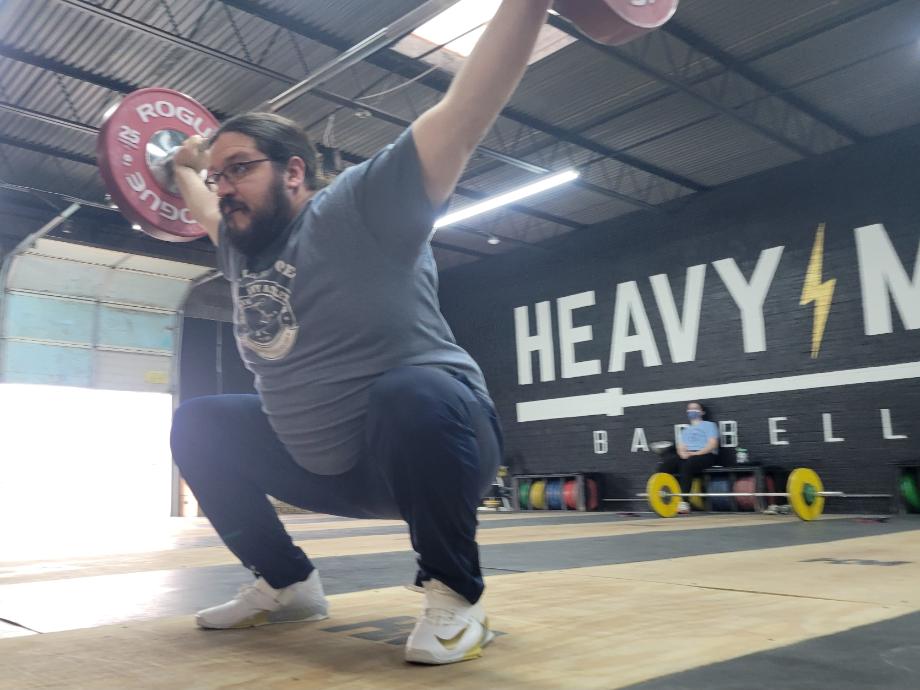
Durability and Construction
Nike is a little vague on the materials used to make the Savaleos, but it does mention a rigid midsole construction. In my use, the midsole did feel pretty rigid during training sessions, especially closer to the forefoot. Additionally, the backs of the heels have mesh construction to add to breathability.
RELATED: TYR L-1 Lifters Review
The heel appears to be made of a dense material, probably plastic, with a rubber outsole. This provides for great stability and connection to the ground while in use.

While I haven’t used the shoes long enough to see how they’d last long-term, the shoes held up great while I maxed out my squat and other lifts. Overall, I give the shoes a 4 out of 5 for their durability and construction.
Adjustments and Ergonomics
The midfoot of the Savaleos has one thick strap to help tighten the shoes in addition to traditional shoelaces. While two straps is a more secure design, I think the Savaleos kept my feet secure enough while doing dynamic exercises like a clean and jerk.
Another thing to note is that Nike warns the sizes run a little small and to order a half-size up. If you’re used to a wide toe-box in your shoes, this may be less than ideal.
Appearance
Shoes aren’t all about looks, but it certainly is nice for a shoe to look good as well as feel good. I give the Savaleos a 4 out of 5 for their appearance. The shoes look very sharp, with fading colors into the heels.
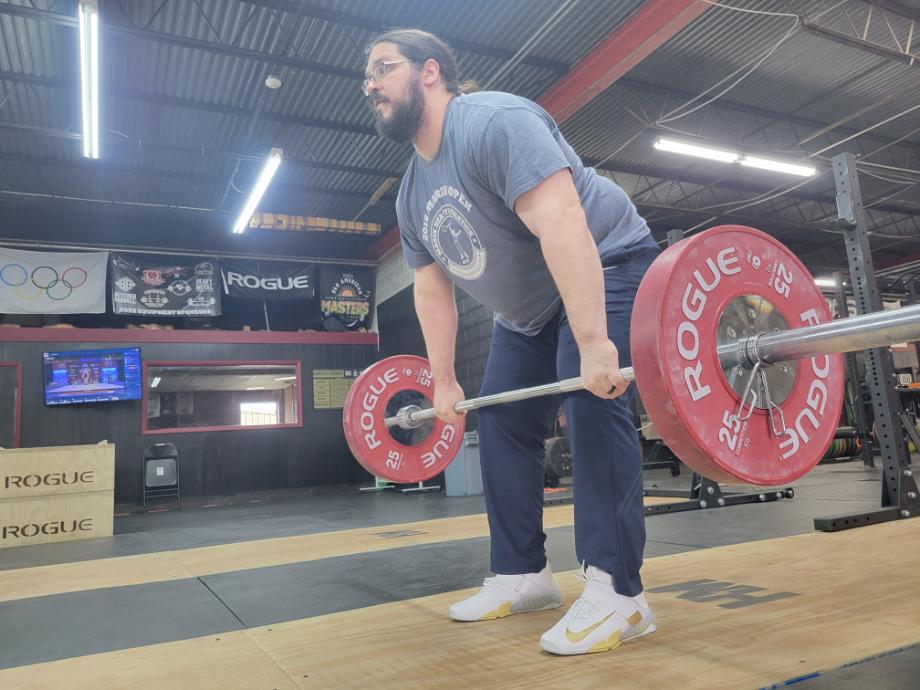
That said, there are limited colorways on Nike’s website: essentially, black or white. You can find other colorways if you purchase from another website, like Rogue Fitness. I chose the White/Metallic Gold/Wolf Gray/Photon Dust colorway, which is basically a white shoe with gold highlights. These are officially my loudest-looking shoes, but I’m not mad about it; the shoes look great.
Nike Savaleos vs Reebok Lifter PR 2
Reebok Lifter PR 2
Reebok Lifter PR 2
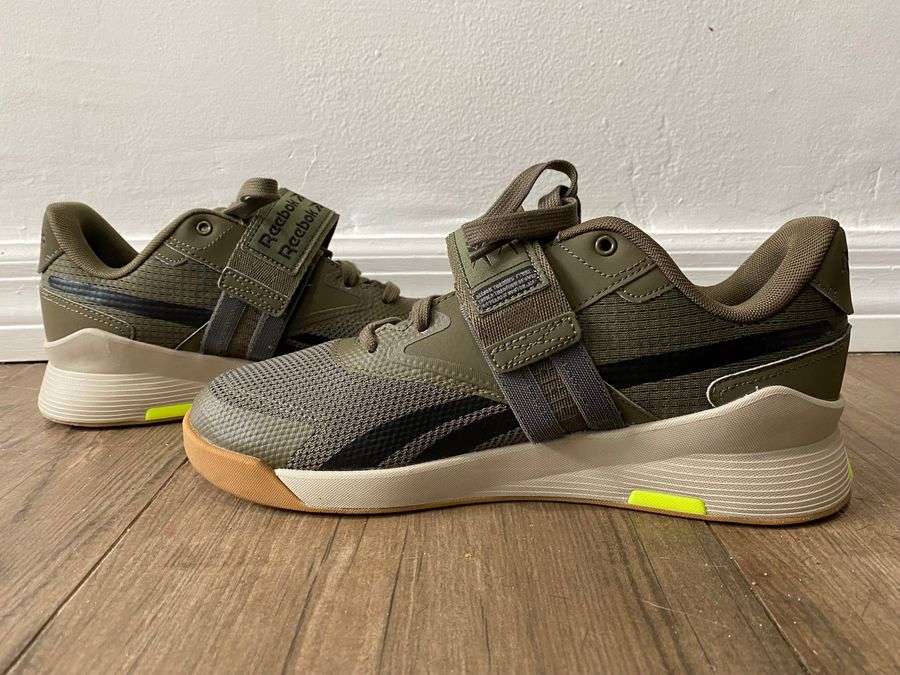
Product Highlights
- Weightlifting shoes with a hybrid feel
- Moderate heel height
- Solid EVA foam heel construction
Pros & Cons
Pros
- Phenomenal price point ($100)
- Moderate heel height makes for a great hybrid shoe
- Rubber outsole provides excellent traction
Cons
- EVA midsole will prove too responsive for heavy lifts
- Heel cup isn’t the most durable and may deform over time
- 15.5mm (about 0.6”) heel height doesn’t provide optimal ankle flexion support
Bottom Line
These are great weightlifting shoes for exercisers who want a solid, stable shoe they can use for weightlifting, powerlifting, and some CrossFit workouts for a reasonable price.
Let’s compare the Savaleos to another budget-friendly shoe: the Reebok Lifter PR 2. Both pairs are inexpensive enough for beginners to use for lifting, and each lifting shoe has some responsiveness to make the shoe work for other exercises—like if you’re in the middle of a metcon or WOD.
The moderate heel height of both shoes adds to the shoes’ versatility, as well. Most high-end lifters have a heel height of 20 millimeters, which would make the shoes a bit more difficult to comfortably use in a CrossFit WOD. I wouldn’t want to do burpees in lifters, but I could use the Savaleos and Reebok Lifter PR 2 for that after cycling some reps on an Olympic barbell.
Although the shoes are very similar, the Lifter PR has a midsole made from EVA foam, which will grant the user a little more responsiveness than the Nike Savaleos. Additionally, I feel the wider base on the Nike shoes makes them feel a bit more clunky when trying to do plyometrics. If you’re interested in a cross-training weightlifting shoe, then the Reeboks are an excellent choice. However, for an inexpensive shoe dedicated mostly to weightlifting, the Savaleos are your best bet.
| Nike Savaleos | Reebok Lifter PR 2 | |
| Price | $125 | $120 |
| Heel-to-toe drop | 15 mm | 15 mm |
| Size range | Men’s 5-18 (Women’s 6.5-19.5) | Men’s 5-15 (Women’s 6.5-16.5) |
| Colorways | Black/White/Gray Fog/Laser Orange, White/Black/Iron Gray, White/Metallic Gold/Wolf Gray/Photon Dust, Gray Fog/Clear Emerald/Total Orange | 11 colorway options |
| Features | Flat, wide base; hook-and-loop strap across midsole; mesh inset at the heel; padded tongue and collar | Strap across midsole, textile upper, rubber outsole, EVA midsole |
Customer Experience
Nike provides an excellent return policy—one of the best when it comes to shoes. Nike has a 60-day return policy on their shoes, no questions asked. The shoes can be worn first to see if they’re the right fit for you, too. Along with this, Nike provides a general two-year warranty (unless otherwise noted) on their shoes—starting from the date of manufacturing. It covers material and workmanship flaws.
RELATED: Best Gym Shoes for Men
Nike has phone numbers and a chat function listed on their website to get in touch with customer service. Along with that, the website has a pretty robust FAQ section for customers, too. I give the customer service a 4.5 out of 5.
Ordering the Nike Savaleos

The Nike Savaleos can be purchased directly from Nike’s website, or from Rogue Fitness. Nike offers free shipping on orders over $50 for Nike members, however, so you can save a bit by ordering from the website. Additionally, Nike allows you to split your payments through Klarna.
Customer Reviews
As of this writing, the Nike Savaleos have 34 reviews on Nike’s website, averaging out to a solid 4.4 out of 5 stars. Most users liked the solid base of the shoes, as well as the quality construction. Many people felt a difference from using ordinary gym shoes and felt this was an excellent entry-level pair of lifting shoes.
The most common criticism was that the shoes run small, being narrow for most customers. The customers recommend going a half or full size up to avoid too small of a shoe. Nike also recommends going a half size up.
Final Verdict of Our Nike Savaleos Review
While the lower heel height threw off my technique in the Olympic lifts, I’d still recommend these shoes to people who have the mobility for them. Nike Savaleos weightlifting shoes are an inexpensive alternative to the most popular brands of lifters, saving you a good amount of money in the process. They’ll also provide more stability for lifting than cross-trainers like the Nike Metcon 9.
While the responsiveness of the shoes may not make them ideal for elite-level weightlifters, this feature can add some versatility to the shoes, making them able to be used in a CrossFit workout—so long as there isn’t running. Whether you’re looking for an inexpensive lifter or you’re new to lifting weights, the Nike Savaleos can be a great addition to your gym bag.
Full Rating
Nike Savaleos
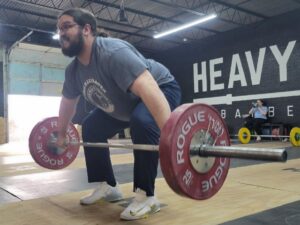
If you’re looking for the best combination of function, style, and price, you can stop right here. The Nike Savaleos are by far the best weightlifting shoes for most people because of their value proposition.
Product Brand: Nike
Product Currency: $
Product Price: 125
Product In-Stock: InStock
4.5
Nike Savaleos Weightlifting Shoes Review: FAQs
Are Savaleos good for weightlifting?
Nike Savaleos are a good shoe for weightlifting, especially for beginners and those seeking affordable prices. At $125, these shoes provide a wide, stable base to stay grounded while moving heavy weights. Although the cushioning is a bit more responsive than most lifting shoes, new users won’t have a problem, and will probably like the added cushion and comfort of the shoes.
What is the lift height of the Nike Savaleos?
The Savaleos have a lower heel height than most popular lifting shoes, which are usually 20 millimeters. The Savaleos have a heel height of 15 millimeters, which requires a touch more ankle mobility.
Do weightlifting shoes make much difference?
Absolutely. The wide, stable base of a lifting shoe helps a lifter feel grounded through heavy lifts, whether it be deadlifts, squats, or Olympic lifts. The raised heel will also put a lifter in a more comfortable and upright position during a squat or similar movement. It makes enough of a difference that I usually recommend it to new athletes I coach who are interested in strength training.


